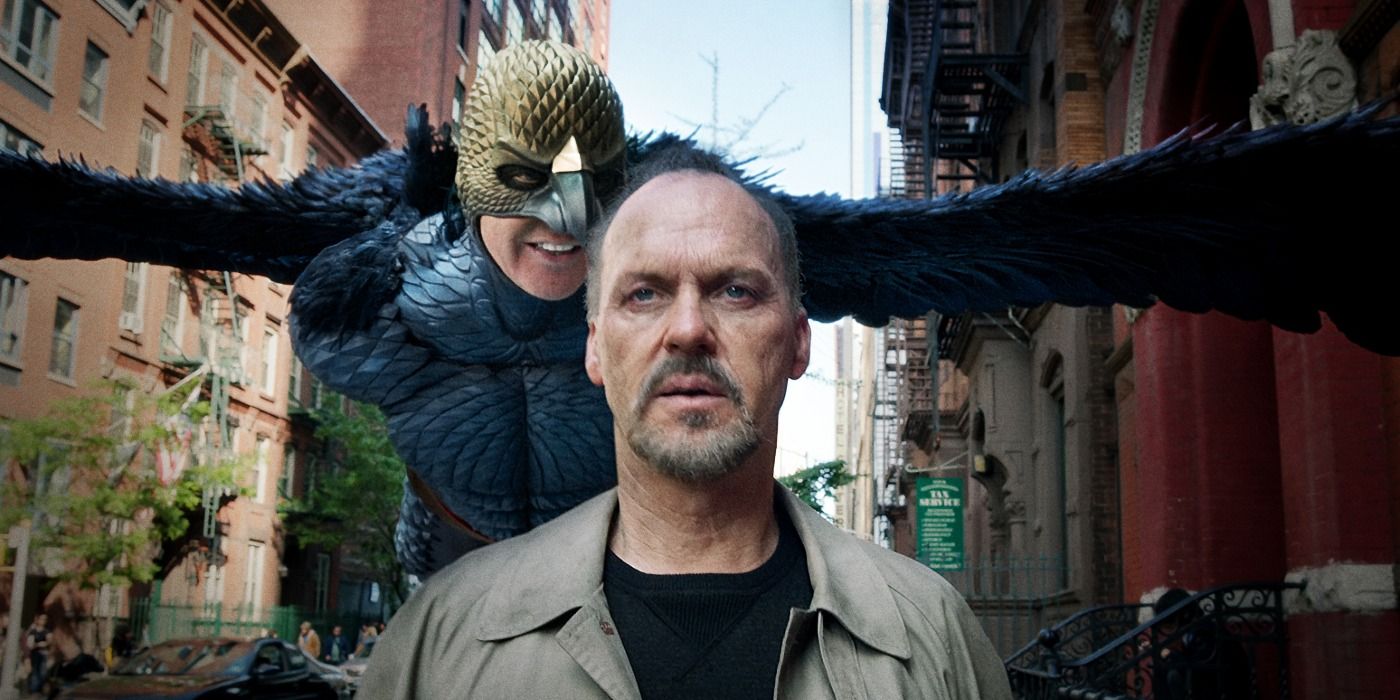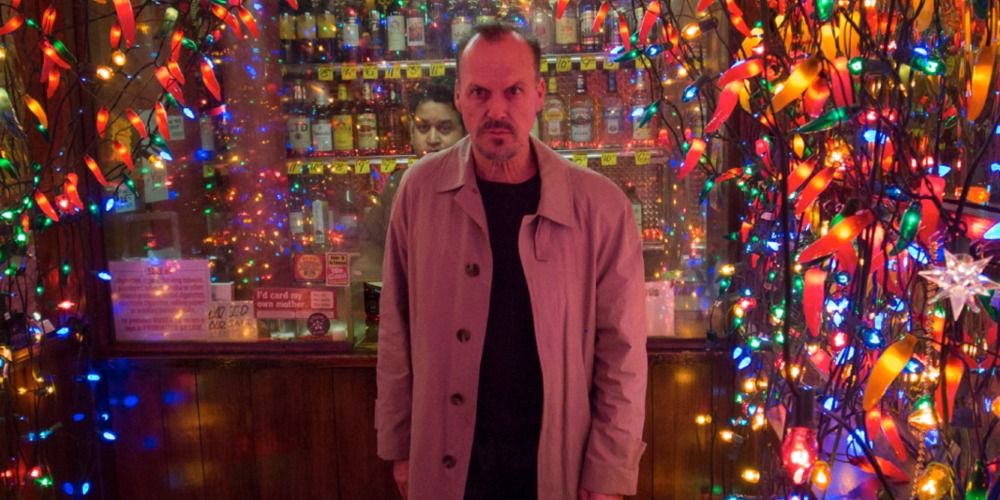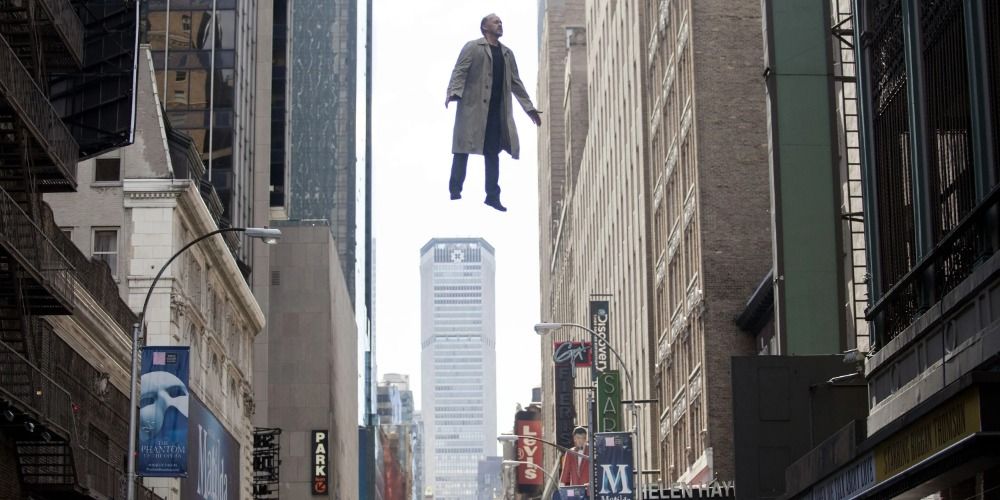
Alejandro G. Iñárritu's 2014 ensemble film Birdman or (The Unexpected Ignorance of Virtue) won Best Picture at the 2015 Oscars for many good reasons: its talented cast, its camerawork designed to feel like one continuous two-hour shot, and its unprecedented dissection of the superhero genre. Iñárritu, an outspoken critic of Hollywood's fixation with superhero movies, managed to produce a feature film that both riffs on and uplifts darker aspects of the genre. Despite Iñárritu's feelings about them, superhero movies aren't going anywhere anytime soon. In fact, Birdman does more to solidify the long-term cultural influence of caped crusaders and their villainous brethren than it does to undermine them. And yes, that absolutely means Birdman is a superhero movie.
Birdman stars Michael Keaton as an aging former Blockbuster movie star named Riggan Thomson, who is remembered for playing the superhero Birdman in three big studio films during the '90s. Riggan formulates a comeback for himself by directing, writing, and starring in a Broadway adaptation of the utterly depressing Raymond Carver short story "What We Talk About When We Talk About Love." Riggan thinks this is his chance to prove his worth as an actor, but the production is afflicted by one problem after the next. This is all made worse by Riggan's spiraling mental health issues.
RELATED: 10 Best Superhero Games Of The 2010s (According To Metacritic)
Casting Keaton, Tim Burton's Batman, as the lead character was no mistake on Iñárritu's part. Keaton's performance is supported by Edward Norton, Naomi Watts, and Andrea Riseborough - who portray Riggan's self-serving co-stars in the play. Emma Stone is Riggan's daughter turned assistant Sam, with whom he maintains a fragile relationship. Birdman follows these characters through the play's early previews, none of which go as planned. At the center of all the chaos lies Riggan, whose ballooning existential crises begin to take on epic proportions.

From the beginning of Birdman, Riggan's titular alter ego stalks him, taunting Riggan about his life choices. As Riggan traverses Times Square, Birdman lurks behind him, asking him why he refused to do a fourth movie in the franchise. Birdman reminds Riggan he is nothing without him, as their identities are indistinguishable from each other. Riggan refuses to accept this, and he spends most of the movie ignoring his past decisions as an actor. With each failed attempt to finish a trial production of the play without trouble, Riggan inches closer toward accepting his fantastical fate: he is Birdman, the commercial superhero he despises.
How does Riggan deal with this realization? He replaces the prop gun with a real one in the scene where his character commits suicide on the final night of the play's review run. Instead of ending his life, the bullet shoots off Riggan's nose, which is reconstructed. The new nose is decidedly much more bird-like than its predecessor, and the film ends with Riggan climbing out of his hospital room window after gazing upon his rebuilt face. Sam arrives a few minutes later and runs toward the open window, smiling as she looks up and presumably sees her father moving through the sky like Birdman.
By definition, superheroes simply possess abilities that set them aside from normal people. While most superheroes harness their powers for good, many are morally ambiguous. This is all reinforced by the special powers Riggan displays throughout the movie, contextualized as hallucinations and visions in the world of Birdman. In the movie's opening sequence, a nearly naked Riggan levitates in his dressing room. As the film progresses, Riggan's telekinetic and levitational proclivities come into stark focus, like when an actor Riggan can't stand is struck by a light fixture that falls without explanation. In another scene, Riggan floats above Manhattan's sidewalks as oblivious pedestrians go about their day beneath him. Later, Riggan destroys his dressing room with extrasensory vigor and even imagines blowing up a city street during a particular fit of rage.

Iñárritu's anti-superhero superhero film centers on psychological character studies and magic realism, leaving much of Birdman's visual sequences and plot developments up to the imagination. Ultimately, what's real and what isn't doesn't matter. The point is following Riggan on his chaotic, messy journey toward self-awareness. Cinematographer Emmanuel Lubezki even incorporates images of flying comets and dead squid on an unknown shoreline to add a sense of scope to Riggan's odyssey. Riggan is the kind of imperfect protagonist whose deeply wounded superhero psyche could very easily fit into the Grant Morrison-era Doom Patrol.
Even though he infamously told Deadline superhero movies point toward a kind of "cultural genocide," Iñárritu also highlights the superficial nature of "real art" through the play Riggan attempts to produce in Birdman. The dichotomy between the mainstream forms of entertainment symbolized by big-budget superhero movies and the more challenging, intellectual fair represented by the play is proven false in the film, as the play's actors (including Riggan) make it clear they are driven by ego and a desire for recognition. Birdman is more the latter than the former, but it manages to reaffirm quite a few of the characterizations that give superhero stories depth. This meta-movie also proves that whether you're Birdman, Batman, or Michael Keaton, identity is a fluid concept.

